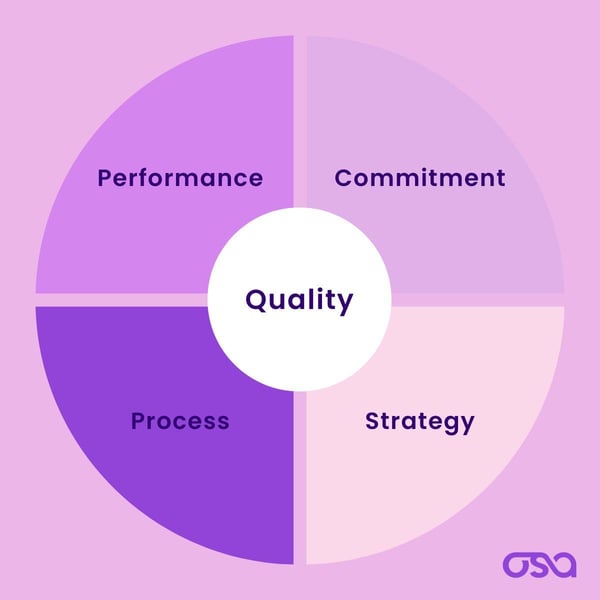5 min read
The Power of Continuous WMS Enhancement for Scaling Businesses
![]() Osa Commerce
:
May 8, 2024
Osa Commerce
:
May 8, 2024

Keeping up with latest technology, processes, and industry trends is imperative to scale supply chain businesses. Continuous improvement helps supply chains to fully optimize processes, enhance efficiency, and improve overall effectiveness.
Explore the significance of continuous WMS enhancement in scaling your supply chain business.
Understanding the Importance of WMS in Supply Chain Operations
In order to effectively scale supply chain businesses, it is crucial to understand the importance of Warehouse Management Systems (WMS) in supply chain operations. WMS plays a vital role in optimizing processes and improving overall efficiency. By implementing a robust WMS, businesses can streamline their operations, track inventory accurately, and ensure timely delivery of goods.
WMS helps in managing various aspects of the supply chain, including inventory control, order fulfillment, and warehouse operations. It provides real-time visibility into inventory levels, allowing businesses to make informed decisions regarding stock replenishment and order fulfillment. With the help of a WMS, businesses can reduce stockouts, improve order accuracy, and enhance customer satisfaction.
In many cases, omnichannel businesses need more than a WMS— they need Collaborative Visibility. Collaborative viability platforms offer stakeholders a single source of truth to drive prescriptive recommendations based on real-time data.

Collaborative Visibility
Collaborative visibility platforms create a network of real-time sharing of data and insights between retailers, brands, and 3PLs to enhance efficiency and transparency within the supply chain—from procurement to delivery.
Third-party logistics (3PLs) providers and brands who use tech-agnostic collaborative visibility platforms with WMS capabilities can automate processes, reduce dependency on manual labor and minimize errors. It offers improved inventory tracking and accuracy, reduces risk, enhanced order management, and overall warehouse productivity.
However, supply chains are continuously changing. Are your technology partners up to the challenge to continue to meet your customers changing needs?
Benefits of Continuous WMS Enhancement
Continuous WMS enhancement offers several benefits. The main benefit is the ability it gives supply chains to keep up with the latest technology and industry trends. By continuously improving WMS and integrated technologies, businesses such as 3PLs, brands, and retailers can leverage new features and functionalities that enhance their operational efficiency.
Continuous WMS enhancement also helps to optimize processes and workflows. to help businesses adapt and improve their operations to stay competitive. By continuously enhancing their WMS, businesses can identify bottlenecks, streamline processes, and improve overall effectiveness.

Continuous system improvement is crucial for supply chain businesses for several reasons:
-
Enhanced Efficiency: By continuously improving processes, supply chain businesses can streamline operations, reduce waste, and optimize resource utilization. This leads to increased efficiency and cost savings.
-
Better Customer Satisfaction: Improving supply chain systems allows businesses to fulfill customer demands more effectively. Faster delivery times, accurate order fulfillment, and consistent quality contribute to higher levels of customer satisfaction.
-
Risk Mitigation: Supply chain improvement initiatives often involve identifying and mitigating risks. This could include supplier disruptions, transportation delays, or inventory shortages. By proactively addressing these risks, businesses can minimize their impact on operations.
-
Adaptability to Market Changes: The business environment is constantly evolving, with changes in consumer preferences, market trends, and technological advancements. Continuous improvement enables supply chain businesses to adapt quickly to these changes, staying competitive and relevant in the market.
-
Cost Reduction: Through process optimization and waste reduction, supply chain businesses can lower operating costs. This could involve reducing inventory holding costs, minimizing transportation expenses, or negotiating better terms with suppliers.
-
Innovation and Agility: Continuous improvement fosters a culture of innovation within the organization. By encouraging employees to identify and implement better ways of doing things, businesses can become more agile and responsive to market dynamics.
-
Compliance and Sustainability: Regulatory requirements and sustainability concerns are becoming increasingly important in the supply chain industry. Continuous improvement efforts can help businesses ensure compliance with regulations and adopt more sustainable practices, reducing their environmental footprint.
Implementing Continuous Improvement Strategies
Implementing continuous improvement strategies is essential for supply chain businesses looking to scale. The most important first step is choosing a supply chain technology partner that values change and consistent improvement.
For example, Osa Commerce works with businesses who require access to the latest features and functionalities for omnichannel and e-commerce fulfillment to meet growing customer expectations from inventory availability, multiple shopping experiences, or last mile delivery choices.
3PLs and their customers should regularly assess their current WMS and identify areas for improvement. This can be done through data analysis, feedback from employees and customers, and benchmarking against industry best practices. By understanding the existing challenges and opportunities, businesses can develop a roadmap for continuous WMS enhancement.
Once a roadmap is created, next is to prioritize the identified areas for improvement and develop a plan for implementation. This may involve upgrading the existing WMS software, integrating new technologies, or reengineering processes. It is important to involve key stakeholders and establish clear goals and timelines for the implementation of improvement strategies.
After improvements are implemented, businesses should closely monitor their impact and gather feedback. This feedback can be used to further refine the WMS and address any issues or challenges that arise during the implementation process.
By implementing continuous improvement strategies, supply chain businesses can enhance their WMS and drive sustainable growth and scalability.
.jpg?width=600&height=600&name=images%20ideas%20(70).jpg)
Continuous Improvement Technology Partners
Continuous improvement should become an integral part of organizational culture to adapt to changing business needs, mitigate risks, and drive long-term success. This can be achieved through regular training and development programs, promoting a mindset of innovation and continuous learning, and rewarding employees for their contributions to the improvement of the WMS.
Most importantly, it should be a requirement for any of your supply chain technology vendors and partners. For example, Osa Commerce is consistently updating our platform based on the feedback from our customers. Every two weeks, we release updates to help our 3PL and brand customers.
Partnering with technology vendors who offer continuous improvements can provide several benefits for businesses:
-
Access to Latest Features and Functionality: Technology vendors that offer continuous improvements regularly update their software or solutions with new features and functionalities. By partnering with such vendors, businesses can leverage these updates to stay ahead of the curve and remain competitive in their industry.
-
Increased Efficiency and Productivity: Continuous improvements often focus on enhancing usability, performance, and automation within technology solutions. This can lead to increased efficiency and productivity for businesses, as employees can accomplish tasks more effectively with improved tools and capabilities.
-
Adaptability to Changing Business Needs: In today's fast-paced business environment, requirements and priorities can change rapidly. Technology vendors offering continuous improvements are more likely to adapt their solutions to meet evolving business needs. This ensures that businesses can scale their operations and address new challenges effectively.
-
Reduced Risk of Obsolescence: Technology evolves at a rapid pace, and solutions that were cutting-edge yesterday may become outdated tomorrow. Partnering with vendors who offer continuous improvements reduces the risk of investing in obsolete technology. Businesses can have confidence that their technology partners are committed to keeping their solutions relevant and up-to-date.
-
Enhanced Security and Compliance: Security threats and regulatory requirements are constantly evolving. Technology vendors that provide continuous improvements often include updates to enhance security measures and ensure compliance with industry standards and regulations. This helps businesses mitigate security risks and maintain regulatory compliance.
-
Cost-Effectiveness: While partnering with technology vendors offering continuous improvements may involve ongoing subscription or maintenance fees, it can be more cost-effective in the long run compared to investing in new technology solutions periodically. Continuous improvements ensure that businesses receive ongoing value from their technology investments without the need for significant upfront costs.
-
Strategic Partnership and Collaboration: Partnering with technology vendors who prioritize continuous improvements fosters a strategic partnership and collaboration between the vendor and the business. This collaboration can lead to mutual success, as both parties work together to innovate, solve problems, and drive business outcomes.

Future Trends in WMS Enhancement for Supply Chain Scaling
The future of WMS enhancement for supply chain scaling is promising, with several trends expected to shape the industry.
One of the key trends is the use of advanced analytics and artificial intelligence (AI) in WMS. By leveraging data analytics and AI technologies, businesses can gain valuable insights into their supply chain operations, optimize processes in real-time, and make data-driven decisions. This leads to improved efficiency, reduced costs, and enhanced customer experiences.
Another trend is the integration of Internet of Things (IoT) devices with WMS. IoT devices such as sensors, RFID tags, and smart shelves enable businesses to track inventory in real-time, automate data capture, and improve inventory accuracy. This results in better inventory management, reduced stockouts, and improved order fulfillment.
Additionally, cloud-based WMS solutions are able to offer greater scalability, flexibility, and cost-effectiveness. Cloud-based WMS allows businesses to access their data and systems from anywhere, making it easier to scale operations and adapt to changing business needs.
With the rise of omnichannel retail, the need for WMS solutions that can handle complex order fulfillment processes is imperative. WMS systems that can seamlessly integrate with e-commerce platforms, brick-and-mortar stores, and third-party logistics providers are becoming essential for supply chain businesses.
Overall, the future of WMS enhancement for supply chain scaling is focused on leveraging advanced technologies, improving data analytics capabilities, and seamlessly integrating with other systems to create a more efficient and customer-centric supply chain.



